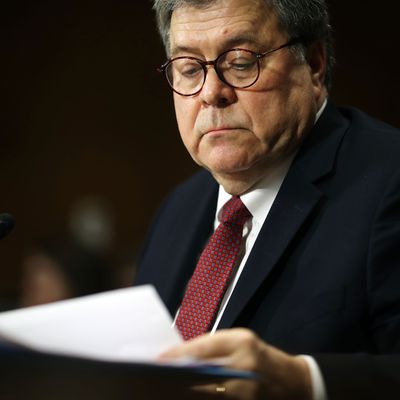
The confrontation between the Trump administration and House Democrats over materials in and underlying the Mueller report escalated rapidly today as the White House made a “protective” claim of executive privilege against the release of documents that the House Judiciary Committee has subpoenaed, even as that committee voted to recommend a contempt citation against Attorney General William Barr for failing to turn over the same documents.
It’s the second move in the direction of cloaking sensitive documents via executive privilege claims in as many days. Yesterday the White House indicated it would likely assert the privilege to stop former Trump counsel Don McGahn from releasing documents related to his testimony to Mueller and his staff.
At issue is the full, unredacted Mueller report, along with documents Mueller made available to the Justice Department in support of his report. Despite an offer to share some of the redacted material to a select group of members of Congress under tight security limitations, Barr has not moved an inch (as far as we know) toward House Democrats’ position that the whole report and associated materials should be released to the entire Congress and to the public. The attorney general’s main rationale is the statutory ban on disclosure of documents derived from grand jury testimony, but it’s likely the White House wants a lid on a lot more than that, particularly in the potentially explosive background material Mueller collected.
When negotiations on a compromise failed before a Monday deadline set by Judiciary chairman Jerrold Nadler, the contempt citation was set into motion and will almost certainly be approved by the committee on a party-line vote today. But in the meantime, the administration has informed Nadler that it is blocking release of all the documents in dispute until Trump has made “a final decision whether to assert privilege following a full review of these materials.”
Assuming Democrats push a contempt citation through the full House, it is likely that both the citation (if the House chooses to enforce it with a fine or some other sanction) and the executive privilege claim will wind up in federal court. Barr’s probably not in any actual danger, and unless the disputed materials are leaked, they probably won’t see the light of day very soon without some increasingly unlikely disclosure deal between Nadler and the White House’s attorneys.
In the debate over the contempt citation, Nadler argued that the administration had already waived any executive privilege claims, presumably by its decision not to make its own redactions to the Mueller report on executive privilege grounds, and by agreeing to release the redacted report in the first place. As former Justice Department attorney Jonathan Shaub explained recently, though, that kind of argument has long been rejected by advocates of presidential power:
The Justice Department has long taken the position, spelled out in a 1989 memo issued by Barr when he was the head of OLC [the Office of Legal Counsel], that the president need not assert executive privilege “except in response to a lawful subpoena.” Because the Justice Department voluntarily released the redacted report and has offered to allow certain members of Congress to read the report with redaction of only the grand jury material, an assertion of executive privilege has not yet become necessary.
Now that there is a subpoena in place, the time is ripe for an assertion of the privilege, which hasn’t been waived since it wasn’t needed earlier. Or so the argument goes: As noted before, only a federal court can sort it out, and legal precedents on these murky issues are few and far between.
So while we can expect a further escalation of rhetoric, including threats and counterthreats from both sides in this dispute, a resolution without extended litigation — probably extending well into the 2020 campaign cycle or even beyond — is very unlikely.
It’s an entirely separate question as to whether the administration’s broad-based stonewalling of Congress on this and other inquiries into presidential misconduct will eventually provoke House Democrats to move forward with impeachment proceedings. Speaker Nancy Pelosi has said she thinks the wily president hopes that will happen, in order to get his troops psyched out of their skulls heading into 2020. It’s hard to know what underlies Trump’s tactics without knowing exactly what he has to hide. And barring leaks, we may not know that for a long time.






























